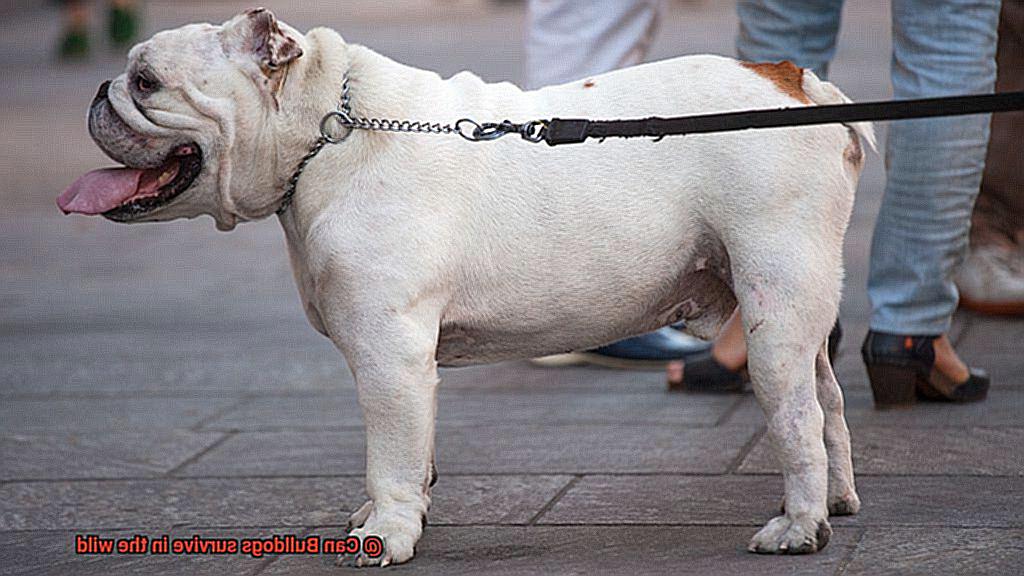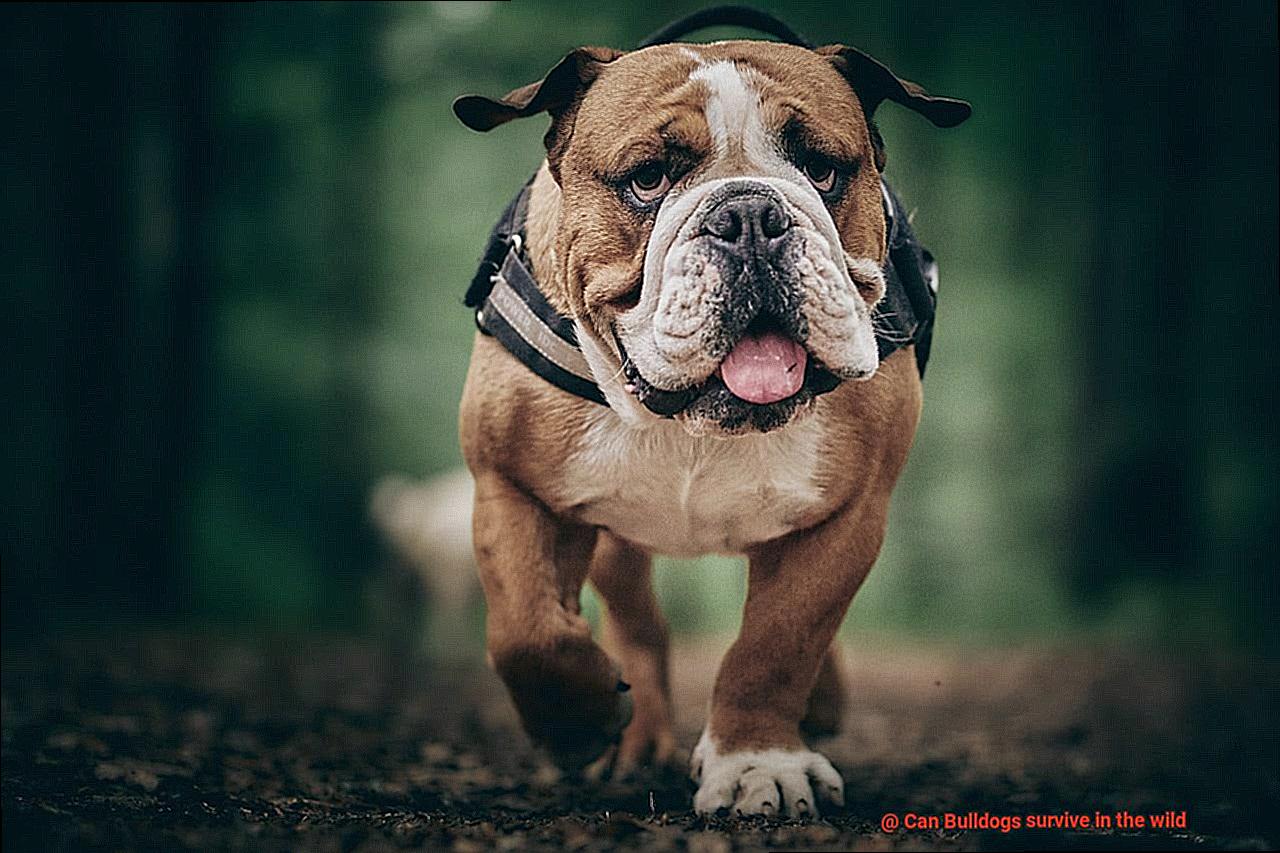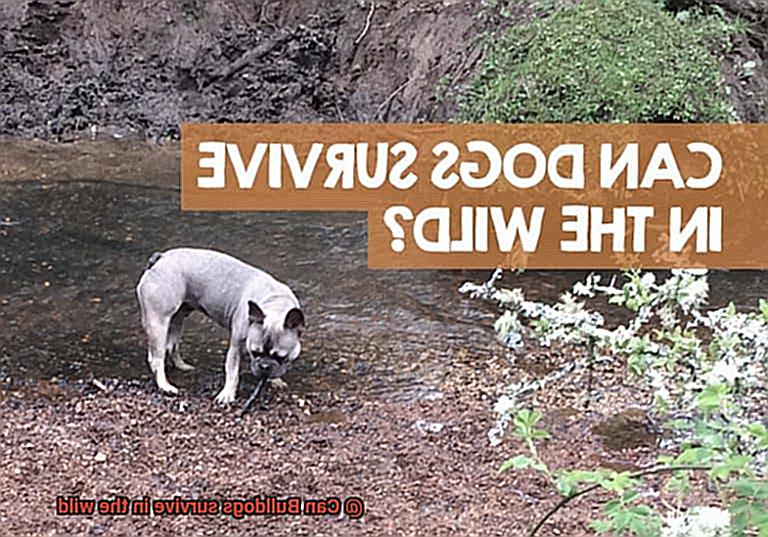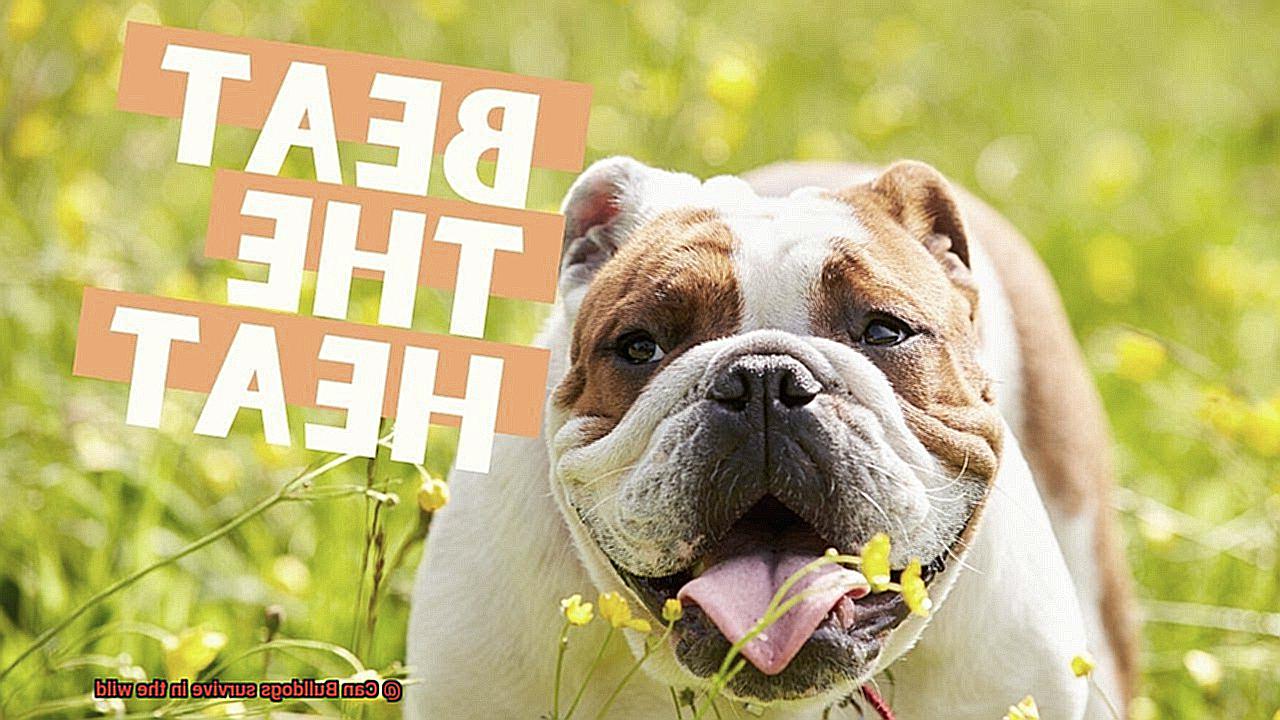Can Bulldogs survive in the wild?
Ever wondered if our cuddly Bulldogs could survive in the wild? Today, we’re diving deep into this captivating question. Join me on a journey as we explore Bulldogs’ genetics, physical attributes, and innate instincts to determine their potential for survival in the untamed wilderness.
Bulldogs, with their stocky build, wrinkled faces, and trademark underbite, may not seem equipped for life in the wild. But hold your horses. Let’s not underestimate these tenacious little creatures just yet. Before we jump to conclusions, let’s understand Bulldogs’ genetic history and how it shapes their capabilities.
Far removed from their bull-battling ancestors, modern Bulldogs have been selectively bred for gentle temperaments and companionship. While these traits make them delightful pets, they might pose challenges when it comes to thriving in the wild.
Now let’s talk about their physical attributes. Bulldogs’ short, stocky bodies are built for power rather than agility. They have limited stamina and a tendency to overheat due to shortened airways. These features are endearing but may not align with the agility needed for hunting or surviving untamed landscapes.
But wait. Despite their gentle nature, Bulldogs still retain remnants of their ancestors’ traits—protective instincts and a strong prey drive. It’s these hidden possibilities that make us wonder if they have what it takes to survive beyond our cozy homes.
So can Bulldogs truly thrive in the wild? Join me as we uncover each puzzle piece that reveals their remarkable potential outside domesticity. In upcoming posts, we’ll delve into Bulldogs’ genetic makeup, temperament, and potential adaptations that might unlock their survival skills in untamed landscapes.
Stay tuned for the next chapter of this thrilling adventure where we dig into Bulldogs’ genetic history and its impact on their wild survival capabilities. Until then, keep spoiling your Bulldogs with love, treats, and belly rubs.
Remember, Bulldogs may surprise us yet.
Physical Characteristics That Can Hinder Survival
Contents
- 1 Physical Characteristics That Can Hinder Survival
- 2 Bulldogs’ Lack of Hunting Instincts and Survival Skills
- 3 The Risk of Overheating for Bulldogs in Hot Environments
- 4 Individual Variations in Adaptability and Resilience
- 5 Factors That Could Increase the Chances of a Bulldog Surviving in the Wild
- 6 How to Prepare a Bulldog for Life in the Wild
- 7 What to Do if You Find a Lost Bulldog in the Wild
- 8 Conclusion

French Bulldogs are beloved pets known for their adorable appearance and gentle temperament. However, have you ever wondered if these cute canines could survive in the wild? In this article, we will explore the physical characteristics of Bulldogs that can hinder their survival in the natural environment.
Brachycephalic Skull:
French Bulldogs have a distinctively flat face and shortened skull, which is called brachycephaly. While this trait gives them their unique look, it can cause breathing difficulties, especially in hot weather or during physical activity. In the wild, where stamina and agility are crucial for survival, Bulldogs may struggle due to their compromised respiratory system.
Overweight Build:
Bulldogs often have a stocky and muscular build, which can lead to excess body weight. This extra weight makes them less agile and slower compared to other dog breeds. In the wild, where speed and agility are essential for hunting or evading predators, Bulldogs may find it challenging to keep up with their counterparts.
Short Legs:
Another characteristic of Bulldogs is their short and stout legs. While these legs are adorable, they limit their ability to navigate rough or uneven terrains efficiently. In the wild, where covering large distances is necessary to find food or escape threats, Bulldogs may struggle to keep up with other animals.
Skin Folds and Wrinkles:
Bulldogs are famous for their loose skin and wrinkles, particularly around their face and neck. While these features add to their charm, they can also pose health risks. The folds of skin easily trap dirt, moisture, and bacteria, leading to skin infections and irritations. In the wild, without access to veterinary care, these issues could become severe and hinder a Bulldog’s overall well-being.
Heat Sensitivity:
Due to their brachycephalic skull, shortened airways, and thick body build, Bulldogs are highly susceptible to heat exhaustion and heatstroke. Their inability to cool themselves efficiently in hot weather can be life-threatening. In the wild, where temperature fluctuations are unpredictable, Bulldogs may struggle to regulate their body temperature effectively, making it challenging for them to survive in extreme climates.
Bulldogs’ Lack of Hunting Instincts and Survival Skills
French Bulldogs, with their adorable wrinkled faces and friendly personalities, have become popular pets worldwide. However, their breed’s transformation over the years has resulted in a significant loss of natural hunting instincts and survival skills. In this section, we will explore the reasons why French Bulldogs are ill-equipped for surviving in the wild, providing valuable insights for owners who want to ensure the safety and well-being of their furry companions.
Absence of Prey Drive:
- French Bulldogs lack the innate prey drive commonly found in hunting breeds.
- Unlike their ancestors, who were used for bull-baiting, French Bulldogs were not bred to be independent hunters.
- Their low prey drive makes it unlikely for them to actively seek out food or engage in hunting behaviors.
Physical Limitations:
- Bulldogs possess short legs and a heavy build, making them less agile and unable to navigate rough terrain effectively.
- Their physical attributes hinder their ability to chase down fast-moving prey or engage in prolonged physical activity.
Brachycephalic Challenges:
- Bulldogs have a brachycephalic skull structure that leads to narrowed airways, resulting in breathing difficulties.
- This can cause overheating and restrict their ability to cope with extreme weather conditions encountered in the wild.
Vulnerability to Predators:

- Bulldogs’ friendly and trusting nature towards humans puts them at risk of being lured or captured by strangers.
- In unfamiliar environments, their lack of survival skills makes them more susceptible to potential dangers.
While individual bulldogs may possess certain survival skills due to variations or training, it is crucial to recognize that as a breed, French Bulldogs are not well-equipped for surviving in the wild.
Owners must take appropriate measures to ensure their pet’s safety and well-being, providing a secure environment and meeting their specific needs. By understanding their limitations, we can ensure a fulfilling and safe life for our French Bulldog companions.
The Risk of Overheating for Bulldogs in Hot Environments
Today, we’ll be diving into a crucial topic that every Frenchie parent should be aware of: the risk of overheating for our beloved furry friends in hot environments. As experts in all things bulldogs, we want to ensure that you have the knowledge to keep your pups safe and comfortable, even during those sizzling summer days.
Why Bulldogs are at Higher Risk
Our adorable Frenchies have a unique facial structure, known as brachycephalic, which means they have short noses and flat faces. While this feature makes them incredibly cute, it also comes with some challenges. Bulldogs struggle to regulate their body temperature effectively, especially when it’s scorching outside. Their shorter nasal passages restrict airflow, making panting less effective for cooling down compared to other breeds. So, it’s essential to be extra cautious when the mercury rises.
The Perils of Overexertion
Another factor that puts our Frenchies at higher risk is their tendency to overexert themselves without realizing it. These little balls of energy may continue playing or exercising, even when they are already showing signs of heat stress. It’s like they just can’t resist having fun. But as responsible dog owners, it’s up to us to make sure they don’t push themselves too hard and end up in danger.
Recognizing Signs of Overheating
So how do we know if our furry friends are overheating? Look out for these telltale signs: excessive panting, drooling, difficulty breathing, rapid heart rate, weakness, collapse, and even seizures. It’s crucial to stay vigilant and recognize these symptoms early on before they escalate into a life-threatening situation.
Prevention is Key
Now that we understand the risks, let’s talk prevention. Here are some paw-some tips to keep your Frenchie cool and comfortable:

- Avoid the Hottest Parts of the Day: Plan your walks and outdoor activities during cooler times, like early mornings or late evenings.
- Shade and Water: Always provide ample shade and fresh water for your pup. A cool, shady spot is their oasis in the heat.
- Limit Physical Activities: As much as our Frenchies love to play, it’s important to limit their physical exertion during hot weather. Take it easy, mes amis.
- No Hot Cars: Never, ever leave your Frenchie alone in a parked car. The temperature inside can skyrocket within minutes and become life-threatening for them.
Cooling Techniques
If you notice your Frenchie starting to show signs of overheating, there are some handy cooling techniques you can try:
- Wet their Paws and Belly: Gently wetting these areas with cool water can help bring down their body temperature.
- Cooling Mats: Invest in a cooling mat designed specifically for dogs. These miraculous mats provide instant relief and comfort.
Individual Variations in Adaptability and Resilience

French Bulldogs are beloved pets known for their affectionate nature and adorable appearance. However, their domestication has made them heavily reliant on human care and protection. In this article, we will explore the individual variations in adaptability and resilience among bulldogs and discuss their ability to survive in the wild.
Genetic Background and Physical Attributes:
- Bulldogs were originally bred for bull-baiting, which required strength and tenacity.
- Selective breeding has resulted in a unique appearance and specific health concerns.
- The brachycephalic skull structure can lead to respiratory issues and difficulty regulating body temperature efficiently, posing challenges in the wild.
- Their compact body structure, short legs, and stocky build may limit agility and speed.
Temperament and Learned Behaviors:
- Bulldogs are generally known for being docile and less active compared to other breeds.
- They may lack natural instincts or survival skills seen in more primitive dog breeds.
- Individual variations in temperament and learned behaviors can influence adaptability and resilience.
Exceptional Cases of Adaptability:
- While bulldogs as a whole may face challenges in the wild, there have been exceptional cases where certain bulldogs have adapted and survived.
- Factors such as genetics, early experiences, and socialization play a role in these individual variations.
- These exceptional cases highlight the importance of considering each bulldog’s specific needs when contemplating exposure to the wild.
The individual variations in adaptability and resilience among bulldogs are essential factors to consider when assessing their ability to survive in the wild.
While their domestication has made them highly dependent on human care, some bulldogs may possess certain traits or behaviors that enhance their chances of survival outside of a controlled environment.
However, it is crucial for owners to prioritize their bulldog’s well-being and carefully consider their specific needs when contemplating any potential exposure to the wild.
Factors That Could Increase the Chances of a Bulldog Surviving in the Wild
When we think of Bulldogs, we often envision them lounging on a cozy couch or playing fetch in the backyard. But what if these lovable companions were faced with the rugged challenges of the wild? Can they tap into their inner instincts and survive in nature’s unforgiving embrace? Let’s explore the factors that could increase a Bulldog’s chances of survival in the wild.

- Instincts and Adaptability: Bulldogs may be domesticated, but they still possess some innate survival instincts. Their tenacity and determination can help them navigate harsh environments and find food and shelter. With their keen sense of smell and hearing, they can hunt prey or avoid potential predators. And let’s not forget their sturdy build and powerful muscles, which make them physically capable of enduring the wild.
- Genetic Variations: While Bulldogs have been selectively bred for specific traits, some genetic variations could increase their chances of survival. Certain bloodlines may hold traits from their ancestors that are better suited for natural environments. These variations could include enhanced agility, stronger immune systems, or better hunting instincts. While not all Bulldogs may possess these advantages, it is possible that some individuals do.
- Acquired Skills and Training: Bulldogs that have received training or exposure to outdoor environments may fare better in the wild. Training can help them develop skills like hunting and navigating unfamiliar terrains. Outdoor activities like hiking or camping can also familiarize them with nature’s elements and teach them survival techniques. Bulldogs with these acquired skills will be more prepared to adapt to the challenges of the wild.
- Social Behavior: Bulldogs thrive in the presence of humans or other dogs, but this social behavior can also benefit them in the wild. If a Bulldog were separated from its human companions, it might seek out the company of other animals for protection and guidance. Forming alliances with other dogs or joining packs of wild animals could increase their chances of survival by gaining collective knowledge and resources.
- Opportunistic Feeding: Bulldogs are known for their hearty appetites, and this characteristic can work in their favor in the wild. While they may not be natural hunters, Bulldogs have shown scavenging behaviors. In a survival situation, they can rely on their opportunistic feeding habits to scavenge for food from various sources like garbage bins or animal carcasses. This adaptability in their feeding habits gives them an edge in finding sustenance.
How to Prepare a Bulldog for Life in the Wild
While bulldogs may not be natural survivalists, with proper preparation and precautions, they can enjoy outdoor adventures safely. In this guide, we’ll discuss how to physically and mentally prepare your bulldog for life in the wild, adapt them to different environments, take safety precautions, and seek professional advice when needed. So grab your leash and let’s embark on a thrilling journey together.
Physical Preparation:
To ensure your bulldog is ready for outdoor adventures, engage them in regular exercise routines that focus on building strength and stamina. Long walks, swimming sessions, and interactive play are great ways to keep them fit. Providing them with a balanced diet that supports their overall health and vitality is also crucial.
Mental Preparation:
Bulldogs can be stubborn, but with consistency, patience, and positive reinforcement, they can learn obedience commands and basic survival skills. Training sessions that focus on recall, hunting instincts, and adapting to different environments will mentally prepare them for life in the wild.
Environmental Adaptation:
Gradual exposure to outdoor elements is key to helping your bulldog adapt. Start by introducing them to controlled outdoor spaces like a secure backyard or park. As they become more comfortable, gradually expose them to different terrains, weather conditions, and wildlife sounds.
This will build their confidence and prepare them for challenges they may encounter in the wild.
Safety Precautions:
While it’s tempting to let your bulldog roam freely, remember they are still domesticated animals with vulnerabilities. Keep them on a leash during outdoor adventures and provide identification tags in case they get lost. Ensure they are up to date on vaccinations to protect them from potential diseases. Finally, consult professionals such as veterinarians or animal behaviorists for valuable insights on ensuring their safety.
What to Do if You Find a Lost Bulldog in the Wild
Finding a lost bulldog in the wild can be both exciting and concerning. Bulldogs are not well-suited for survival in the wild due to their physical characteristics and breeding history.
However, with the right approach and actions, you can help ensure the safety and well-being of the lost dog and increase the chances of reuniting them with their owner. In this article, we will guide you through the steps to take when encountering a lost French bulldog in the wild.
Approach with Caution:
When you come across a lost bulldog in the wild, it is crucial to approach the situation with caution. Bulldogs can be scared or disoriented when away from their familiar surroundings, and they may exhibit defensive or aggressive behavior. Keep a safe distance from the dog and avoid making any sudden movements that could startle or provoke them.

Check for Identification:
The first step is to determine if the bulldog has any identification tags or a microchip. Check around their neck or collar for any contact information. If there are no visible identification markings, consider taking the dog to a nearby veterinary clinic or animal shelter where they can scan for a microchip. This will greatly aid in reuniting them with their owner.
Report to Animal Control or Shelter:
If you are unable to immediately find identification, it is crucial to report the found bulldog to local animal control or the nearest animal shelter. Provide them with a detailed description of the dog’s appearance and location where you found them. This will increase the chances of their owner being reunited with them.
Ensure Safety and Well-being:
While waiting for assistance from animal control or the shelter, it is important to ensure the bulldog’s safety and well-being. Keep them in a secure area away from busy roads or potential dangers. Offer them water if available but avoid feeding them any unfamiliar food without consulting a veterinarian first.
Seek Professional Help:
In some cases, it may be necessary to use cautionary measures such as a leash or makeshift restraint if the bulldog becomes aggressive or attempts to run away. However, it is advised to seek professional help in handling such situations. Animal control or experienced individuals can provide guidance on safely handling and restraining a lost bulldog.
0L7d5wmLTg0″ >
Conclusion
In conclusion, it is highly unlikely that Bulldogs would survive in the wild. Their physical characteristics and genetic makeup make them ill-equipped for life outside of human care. With their short snouts and compact bodies, Bulldogs struggle with breathing and regulating body temperature, which are essential skills for survival in the wild.
Furthermore, Bulldogs have been selectively bred for centuries to be companions rather than hunters or survivors. Their docile temperament and lack of natural instincts make them vulnerable in a harsh and unforgiving environment. Without the guidance and protection of humans, Bulldogs would face numerous challenges such as finding food, defending themselves against predators, and adapting to different climates.
While some dog breeds have managed to revert to a more feral state over time, it is unlikely that Bulldogs would follow suit. Their dependence on humans for survival has become deeply ingrained through years of domestication. They rely on us for food, shelter, and companionship – aspects that are not readily available in the wild.
It is important to remember that dogs, including Bulldogs, have evolved alongside humans for thousands of years. They have become our loyal companions but have also lost many of their natural survival skills along the way. While they may possess certain traits that can aid in survival, such as strength or agility, these attributes alone do not guarantee their ability to thrive without human intervention.
In conclusion, while Bulldogs may possess qualities that we admire as pets, their chances of surviving in the wild are slim at best.




